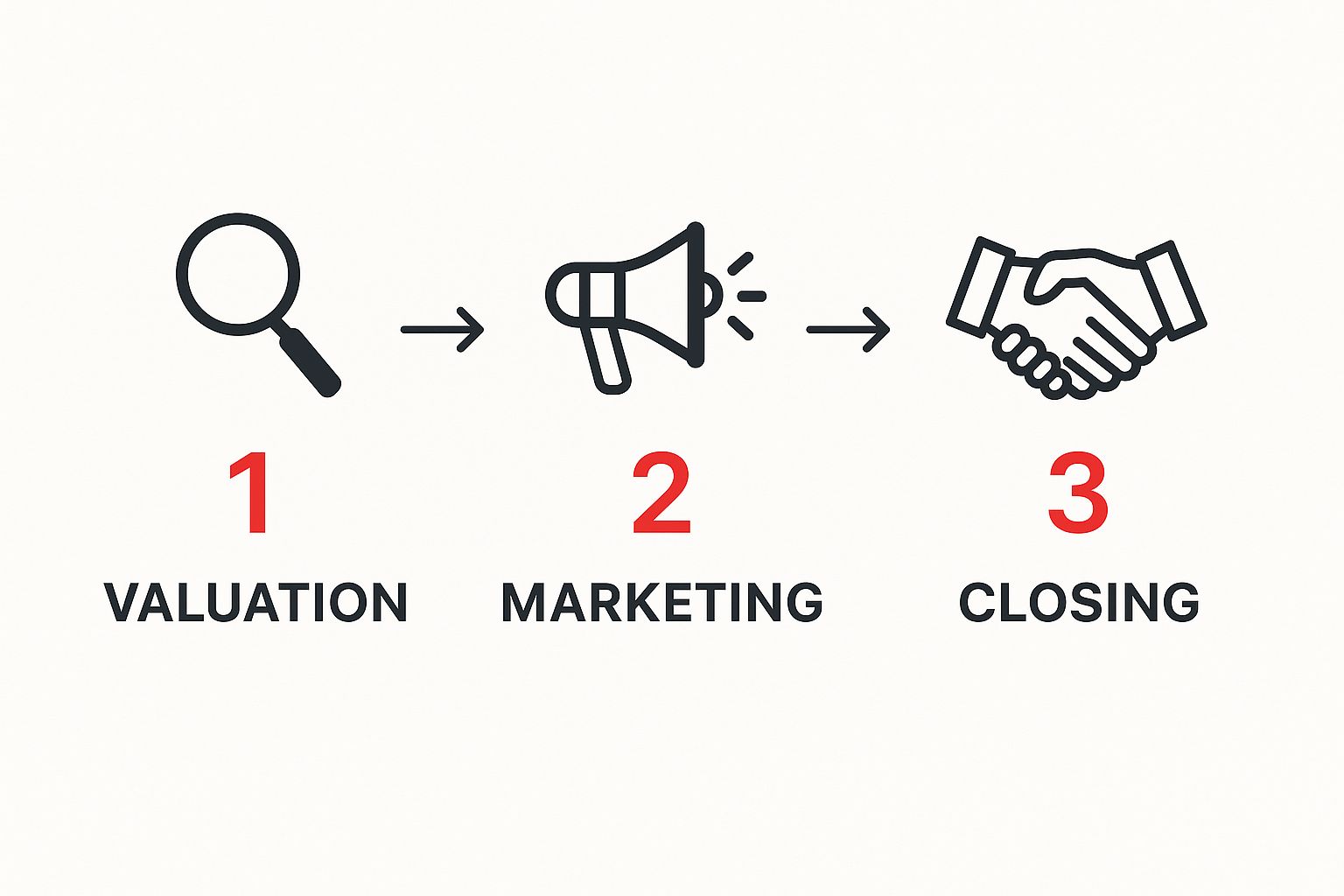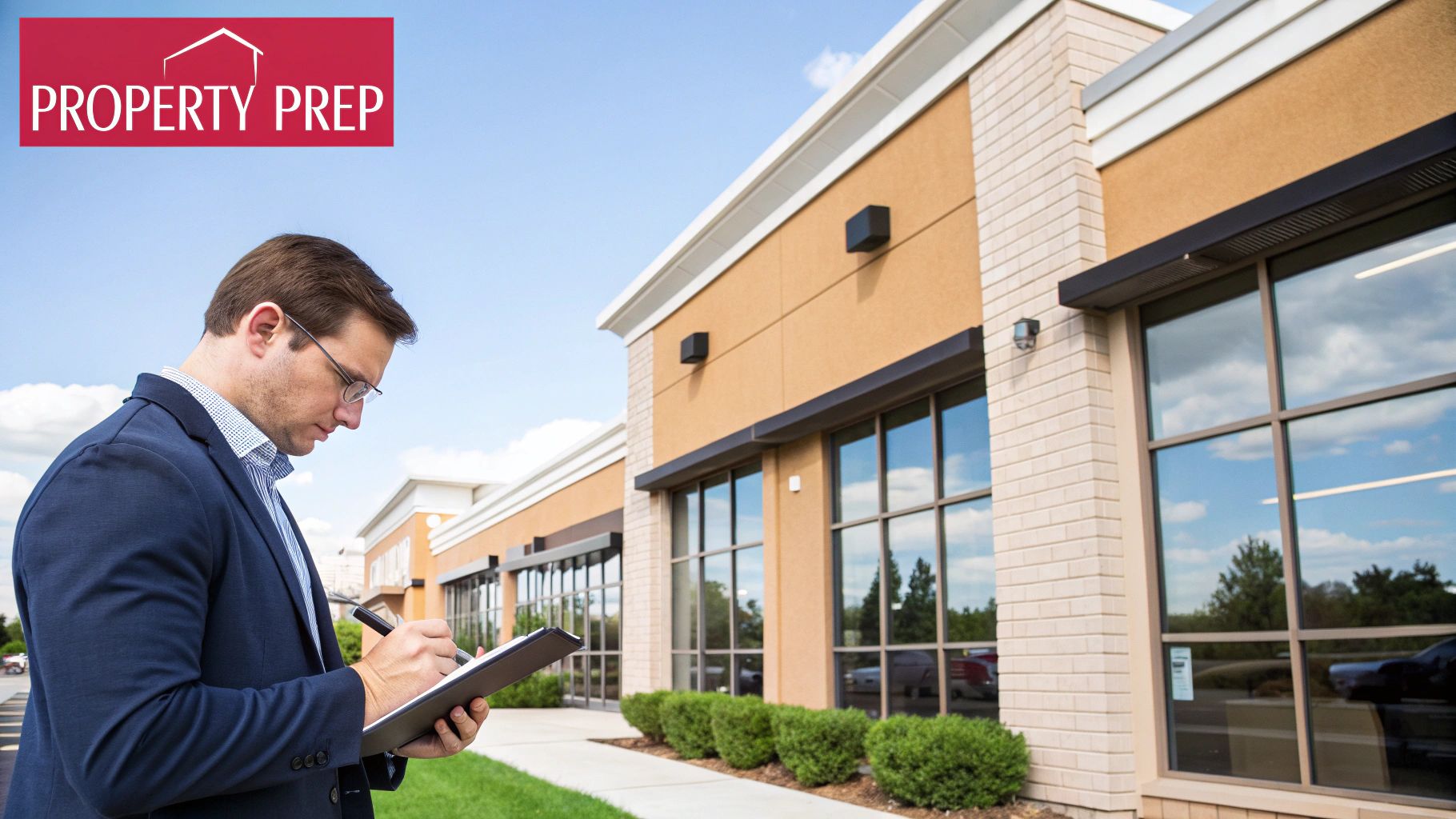Selling a commercial property isn't something you just jump into. It takes a clear-eyed, strategic game plan that covers everything from careful valuation and laser-focused marketing to navigating a smooth closing. The whole point is to truly understand what your asset is worth in today's market, get it in front of the right buyers, and handle the final transaction like a pro. Pulling this off is what maximizes your return.
Your Guide to Selling Commercial Property in Cleveland
Let's be clear: selling a commercial asset in Cleveland, Akron, or Canton is a whole different ballgame. It's shaped by the specific economic currents of Northeast Ohio. Unlike selling a house, which often tugs at heartstrings, commercial deals are all about the numbers. It boils down to one question for the buyer: what's the return on investment (ROI)? Getting this fundamental difference is the absolute first step toward a profitable sale.
This guide will walk you through the entire sales process, from the first look at the numbers to shaking hands at the closing table. We'll get into the real-world conditions of the Northeast Ohio market—the good, the bad, and the unique opportunities you'll find here.
The Core Sales Process
The path to selling your commercial property really breaks down into three main phases. Knowing this roadmap helps set the right expectations and keeps the whole deal from going off the rails.
-
Valuation and Prep: This is where we do a deep dive. We'll scrutinize your property's financials and stack them up against the local Cleveland market to land on an asking price that's not just accurate, but defensible.
-
Strategic Marketing: Once we know the price, the mission is to build a marketing package that tells a compelling story. Then, we get that story in front of a curated list of qualified investors, both here in Ohio and across the country.
-
Negotiation and Closing: This is the home stretch. It involves fielding offers, skillfully guiding the process through the buyer's due diligence period, and nailing down the legal and financial transfer of the property.
I've seen it happen too many times: a seller gets impatient and rushes to list their property without a rock-solid valuation. In the world of commercial real estate, an asking price that isn't backed by hard financials and solid market comps is a non-starter for any serious buyer.
This is a simplified look at how we move from valuation all the way to a successful closing.

Each of these steps logically builds on the one before it. That’s why a methodical, step-by-step approach is so critical to getting the best outcome in the competitive Cleveland market.
To give you a clearer picture, here's a quick summary of what the process looks like from start to finish.
The Cleveland Commercial Property Sales Process at a Glance
This table breaks down the key stages you'll go through when selling a commercial property in the Northeast Ohio market. It highlights what we're trying to achieve at each step and the most important action for you, the seller.
| Stage | Key Objective | Critical Action for Cleveland Sellers |
|---|---|---|
| Initial Valuation & Strategy | Establish a market-correct, defensible asking price. | Provide complete financial documents (rent roll, P&L statements for 3 years). |
| Property Preparation | Address any deferred maintenance and enhance curb appeal. | Complete a pre-listing property condition assessment to identify potential red flags. |
| Marketing Launch | Generate maximum exposure to qualified investors. | Approve a professional marketing package with high-quality photos and detailed financials. |
| Buyer Engagement & Tours | Field inquiries and facilitate property showings. | Be flexible with scheduling and ensure the property presents cleanly and professionally. |
| Offers & Negotiation | Secure the best possible price and terms. | Analyze offers based not just on price, but also on buyer qualifications and contingencies. |
| Due Diligence | Facilitate the buyer's investigation of the property. | Respond promptly to all document requests from the buyer's team. |
| Closing & Transition | Finalize the legal transfer and hand-off. | Work with your attorney to review all closing documents and coordinate the final transfer of funds. |
Seeing the entire journey laid out like this helps demystify the process. By focusing on the critical actions at each stage, we can stay ahead of potential issues and keep the transaction moving smoothly toward a successful close.
Analyzing the Cleveland Market and Valuing Your Property

Before you even dream of a listing price, you need a reality check. What is your property really worth in the Cleveland metro area? This isn’t about what you feel it should be worth; it’s about what the market will bear. A successful sale always starts with a cold, hard look at the local data.
What’s happening on the ground here matters. An industrial warehouse tucked away near the I-480 corridor in Maple Heights has a completely different value proposition than a retail spot in a high-foot-traffic zone like Ohio City. Even a suburban office building out in Westlake plays by its own set of rules. Every single submarket has its own pulse.
Understanding Cleveland's Local Market Dynamics
First things first: you have to zoom in on your specific property type and location. Are we talking about a multi-tenant office building downtown? An industrial facility out in Solon? A small retail strip in Tremont? The performance of these sectors can vary wildly across Cuyahoga County.
You need to dig into the key metrics that buyers obsess over. These are the numbers that directly influence what they’re willing to pay:
- Vacancy Rates: What percentage of similar properties in your immediate area are sitting empty? High vacancy is a red flag for weak demand and will absolutely drag your price down.
- Rental Rates: What are comparable spots leasing for per square foot? This number is the foundation of your property’s income potential.
- Absorption Rates: How fast is available space getting leased up? A high absorption rate signals strong demand—a powerful selling point you can take to the bank.
I’ve seen too many Cleveland sellers make the classic mistake of looking at city-wide data. The truth is, the commercial market is hyper-local. The fundamentals for an office property in Beachwood are worlds apart from one just a few miles away near University Circle.
Selling commercial real estate today means facing some new realities, especially around vacancy rates and what tenants are looking for. Nationally, the office sector is getting hammered with a record-high vacancy rate around 19.6%, thanks to the rise of hybrid work. On the other hand, industrial properties are in a much stronger position, with vacancies closer to 6.8%. This just goes to show your pricing strategy has to be informed by what’s happening in your specific sector right now. For more on this, check out these commercial real estate statistics for 2025 and see how they could impact your sale.
Choosing the Right Valuation Method
Once you have a solid feel for the market, it’s time to put a number on paper using a formal valuation method. In commercial real estate, we rely on three main approaches. The right one for you really depends on the asset you're selling.
The Sales Comparison Approach
This is the most straightforward method, much like how residential homes are valued. You simply analyze recent sales of comparable properties nearby. For instance, if you're selling a 20,000-square-foot warehouse in Euclid, we'd pull comps of similar-sized industrial buildings in nearby suburbs like Strongsville or Mentor to establish a baseline price per square foot. It works best for owner-occupied properties or when there's a good amount of recent, similar sales to look at.
The Cost Approach
This one calculates what it would cost to build your property from the ground up today, then subtracts depreciation. It’s most useful for unique properties that don't have many direct comparables, like a specialized manufacturing plant in Parma or a brand-new development in Avon. It’s less common for typical investment sales, but it can provide a useful ceiling for a property's value.
The Income Approach
For most investment properties in the Cleveland area, this is the big one. This is the method that matters most. Buyers are buying a return, so they value the property based on the income it spins off.
It all comes down to calculating the Net Operating Income (NOI)—that’s your property’s total income minus all operating expenses (but not your mortgage). That NOI is then used to determine the property's value using what we call a capitalization rate, or "cap rate."
Assembling Your Financial Arsenal
To make a compelling case for your asking price, you need to have your financial documents locked and loaded. Serious buyers will put these records under a microscope during due diligence. Being prepared from day one shows you’re a professional and transparent seller, which builds immediate trust.
Get these key documents gathered and organized now:
- Rent Roll: A detailed report of all your tenants, their lease terms, what they pay, and any scheduled rent bumps.
- Profit & Loss (P&L) Statements: You'll need at least three years of P&Ls showing all income and every single expense.
- Capital Expenditures List: A clear record of any major improvements or repairs you've made, like a new roof, HVAC system, or parking lot resurfacing.
Having this information ready to go does more than just justify your valuation; it speeds up the entire deal. It empowers you to confidently defend your price and gets you one step closer to the closing table.
Getting Your Property Ready for a Successful Sale

First impressions in commercial real estate are less about cozy feelings and more about a buyer’s cold, hard assessment of risk and future costs. Think about it: a well-maintained property tells a potential investor that this is a well-managed, solid asset. That’s exactly what they’re hunting for.
Before you even think about snapping a single photo, getting your Cleveland property ready—both physically and financially—is a non-negotiable step.
This whole process is about more than slapping on a fresh coat of paint. You're building a rock-solid case for your property's value and preemptively answering every tough question a serious buyer will throw your way.
Polishing the Physical Asset
Deferred maintenance is an absolute deal-killer. It’s that simple.
When a potential buyer tours your space and spots a leaking faucet, cracked pavement in the parking lot, or an ancient HVAC system, they don't just see a minor repair. They see dollar signs, future headaches, and a big reason to lowball their offer.
Your goal is to present a turnkey asset, or something as close to it as humanly possible. Start by walking your property with the critical eye of a buyer who’s looking for problems.
- Boost That Curb Appeal: This is your property’s first handshake. Make sure the landscaping is sharp, the building exterior is clean, and any signage is in perfect shape. For a retail spot in a place like Shaker Heights, this can instantly shape a buyer's opinion of tenant quality.
- Tackle Deferred Maintenance: Fix all those small things that collectively scream "neglect." Repair water stains, replace every last burned-out lightbulb, and check that all doors and windows work smoothly.
- Inspect the Big Stuff: Get your HVAC, plumbing, electrical, and roofing systems professionally inspected and serviced. Having clean, recent inspection reports to hand over is a massive confidence booster for buyers.
Assembling a Bulletproof Due Diligence Package
While the physical condition sets the stage, the financial paperwork tells the real story. In the world of commercial real estate, buyers aren’t just buying a building; they’re buying an income stream and a set of legal obligations. Having your documents in order from day one is critical.
A messy, incomplete set of documents sends a terrible signal. It suggests the property itself is probably just as disorganized, creating immediate distrust and bogging down the entire transaction.
This collection of documents, often called a due diligence package or "deal room," shows you're a professional who means business. When it's ready before you even list, a buyer’s team can dive in and efficiently verify your claims, which can dramatically speed up the timeline to closing.
This package needs to be comprehensive. A buyer will want to see everything that could possibly impact the property's operation and profitability.
Key Documents for Your Cleveland Property
Trust me, gathering these items takes time, so starting early is a huge advantage. Here’s a checklist of what you'll need to pull together for your Cuyahoga County property:
| Document Category | Specific Items to Include |
|---|---|
| Financial Records | Three years of Profit & Loss statements, a current rent roll, and a detailed list of all capital expenditures from the last five years. |
| Lease Agreements | Clean copies of all current tenant leases, along with any amendments, extensions, or personal guarantees. |
| Service Contracts | Active contracts for services like landscaping, snow removal, security systems, and waste management. |
| Property Information | A current property survey, the building’s blueprints, and a specific list of any personal property included in the sale. |
| Legal & Compliance | Recent property tax statements from Cuyahoga County, current zoning info from the city (e.g., Cleveland, Lakewood), and any environmental reports you have, like a Phase I ESA. |
| Maintenance & Permits | Records of major repairs, warranties for key systems (like the roof or HVAC), and any permits for recent construction or renovations. |
Organizing these documents into a digital folder makes it incredibly easy to share with qualified buyers after they’ve signed a confidentiality agreement. This level of preparation doesn’t just build trust—it gives you a serious leg up for a smoother, faster, and more profitable sale.
Getting Your Property in Front of the Right Buyers

Alright, your property is looking its best and the financials are buttoned up. Now the real work begins.
Selling commercial property in Cleveland isn’t a passive sport. You can't just stick a sign in the window and wait for the phone to ring. What separates a property that sells quickly at a great price from one that collects dust on the market is a proactive, multi-channel marketing plan.
Your entire strategy has to be laser-focused on reaching the right audience—the investors, business owners, and developers actively hunting for assets just like yours in Northeast Ohio. This isn't about just listing your property; it's about creating a compelling story around it.
Crafting High-Impact Marketing Materials
Before you even think about going public, you need a professional marketing toolkit. Think of these materials as your property’s resume. They need to make a powerful first impression on sophisticated buyers who are sifting through dozens of opportunities every single week.
It all starts with top-tier visuals. Grainy cell phone pictures are an immediate deal-killer.
- Professional Photography: Bring in a photographer who specializes in architectural and real estate work. They know exactly how to capture the best angles, lighting, and key features of your building, whether it’s an industrial space in Bedford Heights or a retail strip in Westlake.
- Virtual Tours and Drone Footage: For larger properties or buildings with unique layouts, a 3D virtual tour (like a Matterport scan) is a game-changer. It lets out-of-state investors walk the entire space from their desks. Drone footage is fantastic for showcasing a property’s location, parking, and easy access to major arteries like I-77 or I-90.
The crown jewel of your marketing package is the Offering Memorandum (OM). This isn't just a flyer; it's a detailed, professional document that acts as a comprehensive business plan for the property. It gives a serious investor everything they need for their initial analysis. A strong OM for a Cleveland property will always include a deep dive into the local submarket, highlighting neighborhood strengths and recent positive developments.
Leveraging Digital and Traditional Channels
With your marketing assets ready to go, it’s time for distribution. The best campaigns blend modern digital platforms with old-school, relationship-based networking. You have to be everywhere the real buyers are looking.
For nearly every commercial broker and investor, the first stop is one of the major online listing services. Getting your property featured here is non-negotiable.
- CoStar: This is the undisputed leader for commercial real estate data and listings. It's a subscription-based platform used by virtually every serious professional in the industry.
- LoopNet: As CoStar's public-facing site, LoopNet is the most heavily trafficked commercial real estate marketplace online. It casts the widest net, reaching a massive audience of potential buyers.
A common mistake is thinking a LoopNet listing is all you need. While it’s essential for broad exposure, the most valuable deals in Cleveland are often sourced through a broker's personal network long before they hit the open market.
This is where traditional brokerage relationships prove their worth. An experienced Cleveland-based commercial broker has a curated list of active local and national buyers. They can make direct calls and send targeted emails to investors they know are looking for a specific type of asset, putting your property in front of the most qualified and motivated prospects first.
Tailoring Your Message and Qualifying Buyers
Your marketing message can't be one-size-fits-all. You have to shine a spotlight on the specific features that will resonate most with your target buyer.
For an industrial warehouse near Cleveland Hopkins International Airport, you’d hammer home the logistical advantages. For an apartment building in Tremont, you would focus on the high rental demand and vibrant neighborhood scene.
As interest starts to build, you absolutely must have a rigorous process for qualifying potential buyers. The goal is to separate the serious contenders from the window shoppers so you don't waste months on a deal that was never going to happen.
A qualified buyer should be able to show you:
- A proven track record of closing similar deals.
- The financial capacity to complete the purchase, often backed by a proof of funds letter or a lender pre-approval.
- A clear understanding of the Cleveland market and your property's specific niche.
Vetting buyers upfront ensures that when you head into negotiations, you’re dealing with someone who is both willing and able to get to the finish line. This is also where understanding different paths to a sale can be useful. For some owners, exploring options beyond a traditional listing can provide certainty and speed. You can compare different selling approaches to see what best fits your goals.
The current market also plays a huge role. The commercial real estate outlook is shifting, with 88% of real estate executives expecting higher revenues—a major turnaround from prior years. Sector performance varies wildly; multifamily properties are hot, with net absorption up nearly 19%, while office vacancies are at historic highs of 19.6%. Industrial assets remain strong with stable vacancy rates around 6.8%. This data underscores why you must tailor your marketing—go aggressive for industrial and multifamily, but be more patient and highlight value-add potential for office spaces.
Navigating Negotiations and Due Diligence
Getting an offer on your Cleveland property feels like a huge win. But pop the champagne later—this is where the real work begins. Now you have to turn that promising piece of paper, the Letter of Intent (LOI), into a closed deal. This part of the process is a true test of your patience, preparation, and strategy.
Think of that initial offer as just the opening gambit in a much bigger game. A seasoned seller knows the headline price is only half the story. The terms and conditions tucked away in the fine print are often what make or break the deal long before you get to the closing table.
Evaluating Offers Beyond the Price Tag
When an offer for your property in Lakewood or Parma hits your inbox, it's natural to jump straight to the price. But a high offer with shaky terms can fall apart in weeks, leaving you right back where you started.
You need to break down every part of the offer to see how serious the buyer is and if the deal can actually survive the next few months.
Here’s what I always look at first:
- Buyer’s Financial Strength: Who are they? A well-known local investor with a track record in Cleveland, or an out-of-state company you’ve never heard of? Insist on seeing proof of funds or a pre-approval letter from a solid lender. No exceptions.
- Contingencies: These are the "get out of jail free" cards for the buyer. Common ones are financing, inspection, and appraisal contingencies. The fewer of these, the stronger and more reliable the offer.
- Earnest Money Deposit: How much skin are they putting in the game? A healthy earnest money deposit, typically 1-3% of the sale price, shows they're committed and not just kicking tires.
- Due Diligence Period: How much time do they need to poke around? A request for 30 days is much better than 60 or 90 days. A shorter timeline keeps the pressure on and reduces the chances of the deal going cold.
- Closing Timeline: Does their proposed closing date work for you? A buyer who can close fast is often worth more than a slightly higher offer from someone who needs to drag things out.
Mastering the Art of the Counter-Offer
It's pretty rare for the first offer to be the final one. Your counter-offer is where you shape the deal to fit your needs. And it’s not just about bumping up the price; it’s about tightening up the entire agreement to protect yourself.
When you counter, you can push back on any weak points. If the price is right but the due diligence period is way too long, propose a shorter one. If the earnest money is weak, ask for more. Every move you make should strengthen your position and make a successful close more likely.
If you're weighing your options and this whole back-and-forth sounds like a headache, it's worth seeing how our buying process works for a more direct path to selling.
Facilitating a Smooth Due Diligence Process
Once you’ve agreed on a price and terms, the due diligence clock starts ticking. This is the buyer’s chance to lift the hood and make sure everything you’ve said about the property is true. Expect their team of inspectors, appraisers, and accountants to go over everything with a fine-tooth comb.
Your job here is simple: be an open book. Quick, organized responses are your best friends. If you put together that due diligence package I mentioned earlier, this part will be a breeze.
The due diligence period is where most deals die. If you’re slow to provide documents or seem like you’re hiding something, you’ll spook the buyer and give them an easy reason to walk away. Transparency is everything.
The current market makes this phase even more critical. Commercial real estate is facing high interest rates, often over 5% even for stable properties, which puts a lot of pressure on valuations. Lenders are being extra cautious, and with a huge wave of commercial loans maturing in 2025, they're only betting on sure things. This means your property's financial records need to be spotless.
Be ready for requests for everything from tenant leases to old utility bills. The more cooperative and prompt you are, the more trust you build—and that trust is what gets everyone to sign on the dotted line at closing.
Common Questions About Selling Commercial Property in Ohio
When you're thinking about selling a commercial property in Cleveland, questions are bound to pop up. The process is loaded with local quirks, from figuring out timelines to getting a handle on the costs. Having clear, no-nonsense answers is the first step toward feeling confident about the sale.
This section dives into the most common questions we get from property owners all over Northeast Ohio. My goal here is to give you practical, local insights that cut through the jargon and help you make the right calls for your situation.
How Long Does It Take to Sell a Commercial Property?
Honestly, the timeline for selling a commercial property around Cleveland can be all over the map. It really boils down to the type of property you have, its price tag, and what the market's doing at the moment.
As a general rule of thumb, you should probably brace yourself for a 6 to 12-month process. For really unique assets or properties with a high asking price, it's not unheard of for it to take even longer.
This timeline usually breaks down into a few distinct stages:
- Prep and Marketing: Give yourself 1-3 months to get the property show-ready, pull together all the necessary paperwork, and kick off a solid marketing campaign.
- Finding a Buyer: This is often the longest phase. It can easily take another 2-4 months to stir up real interest, give tours, and get a qualified buyer to sign on the dotted line.
- Due Diligence and Closing: The home stretch. This last part, filled with inspections, appraisals, and legal legwork, typically takes an additional 2-3 months to wrap up.
Some properties just move faster than others. A well-located industrial warehouse in a hot spot like Independence or a multifamily building in a desirable suburb like Beachwood might get snapped up quickly because investor demand is high. On the flip side, a large, empty office building in downtown Cleveland could linger on the market, reflecting the higher vacancy rates we're seeing in that sector.
What Are the Typical Closing Costs for Sellers in Ohio?
When you sell a commercial asset in Ohio, you've got to factor in closing costs. You should budget for these to be somewhere in the ballpark of 6% to 10% of the final sale price.
The biggest slice of that pie is almost always the real estate brokerage commission. While it's negotiable, it often lands between 4% and 6% of the sale price.
But that's not all. There are a few other significant costs to keep on your radar:
- Ohio's Conveyance Fee: This is simply the state's real property transfer tax. Here in Cuyahoga County, the fee is $4 per $1,000 of the property's sale price.
- Attorney's Fees: You absolutely want a real estate attorney in your corner to review contracts and protect your interests. Their fees are part of your closing costs.
- Title Insurance: It's standard practice in Ohio for the seller to pay for the buyer's title insurance policy.
- Prorated Expenses: You'll also need to cover your share of property taxes and any utilities right up to the day of closing.
Getting a detailed cost estimate from your attorney or broker as early as possible is a smart move. It lets you get a real picture of your net proceeds and helps you avoid any nasty surprises at the closing table.
Do I Need a Specialized Commercial Broker in Cleveland?
Look, while Ohio law doesn't force you to use a broker, going it alone on a commercial property sale is a huge gamble. I can't stress this enough: hiring a commercial real estate broker with deep, specific experience in the Cleveland market is the way to go.
Commercial deals are a different beast entirely compared to selling a house. They involve complex financial modeling, access to industry-only marketing platforms like CoStar, and tough negotiations with savvy investors and their teams of lawyers and accountants.
A good local Cleveland broker brings a ton to the table:
- An Established Network: They have a go-to list of qualified local and national buyers who are actively hunting for properties in Northeast Ohio.
- Local Market Intel: They have a granular understanding of local zoning, economic shifts, and development projects in key zones like the Health-Tech Corridor or the Flats.
- Pricing Expertise: They know how to price your property right from day one—which is absolutely critical for attracting the right kind of buyers and getting you the best possible price.
Trying to juggle all this by yourself can be completely overwhelming. For a deeper dive, we've put together answers to even more common questions on our frequently asked questions page about selling property.
At Home Sweet Home Offers, we know the traditional sales route isn't a perfect fit for everyone. If you're looking for a faster, more direct way to sell your property in the Cleveland area, we provide clear options tailored to your unique situation. We specialize in creating stress-free solutions that give you certainty and control. https://www.homesweethomeoffers.com
Article created using Outrank

